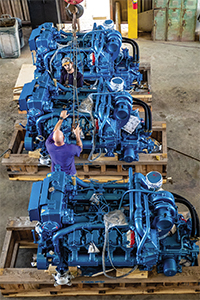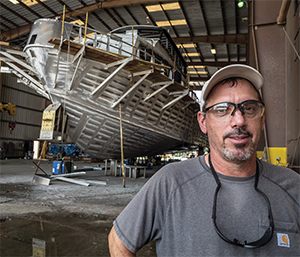Although the crew boat shipyards, tucked among the sugarcane fields lining Bayou Teche in south Louisiana, are in a deep slump, Gulf Craft, Breaux Brothers and Breaux’s Bay Craft are still employing skeleton crews on a smattering of orders.
During the boom years, oil patch money, like a magnet, drew the aluminum yards away from their roots of building fishing boats, patrol boats, research vessels, ferries and the like, to constructing crew boats and fast supply vessels (FSVs). Now, they are moving back to those roots.
On a walk around Breaux’s Bay Craft in Loreauville for a look at a 202-by-32-foot FSV for Tobias Inc. of Erath, La., engineer Beau Seguro said that business is very slow. At the moment, Breaux’s is designing a 30-foot fishing boat and has a number of bids out. But that is it. Like other yards, Breaux’s is fishing for any type of aluminum boat to build, including yachts, a classification it was successful at until the oil industry came calling.
 |
|
The Breaux Brothers crew boat will be powered by three Baudouin Tier 3 main engines. |
|
Brian Gauvin |
Breaux Brothers, also in Loreauville, has an unusual crew boat under construction for Holland America. The 105-by-24-foot vessel will ferry personnel and containers filled with beach furniture, food and cooking equipment from ship to shore for beach parties for passengers, who follow later in tenders.
Joe Louviere, yard superintendent, said the cruise ship sector is a growing market. A lot of the smaller shore boats are older and “there are new cruise ships under construction, so they will need more boats,” he said. The company is working hard to establish a long relationship with Holland and other cruise line companies.
At Gulf Craft in Franklin, the Tibbs family is also working hard to diversify. While steadily constructing two FSVs for SEACOR Marine, the yard has delivered Seastreak Commodore, a 600-passenger ferry to Seastreak LLC in New Jersey (see profile here), and two boats to the Bar Harbor Whale Watch Co. in Maine.
Scotty Tibbs, Gulf Craft’s vice president and chief financial officer, is not hopeful for a return to the good old days when the yard typically had four FSVs under construction in the sheds and one finishing up in the slip. Instead, he speculates the oil companies will choose from the existing fleet, much of it stacked in the bayous lining the Louisiana coast.

